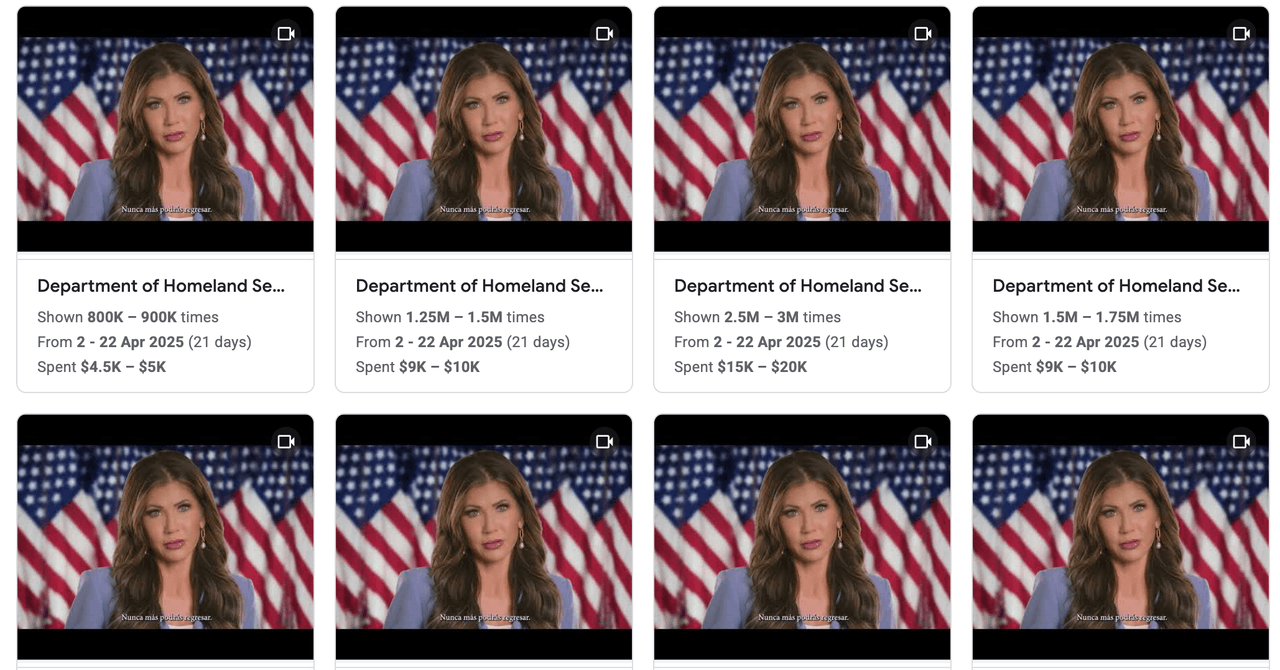The US spent more than $500,000 on hyper-target YouTube ads to discourage irregular transitions
Just two months later, these same ads began airing on free broadcast television in Mexico during soccer games and primetime shows. In one of the messages, Noem warns: “If you are considering coming to the US illegally, don’t think about it, let’s be clear.
The initiative is part of the broader context of state and federal campaigns aimed at blocking immigration, ranging from public communication strategies such as signs and information messages to more aggressive measures such as the establishment of barbed wire and deportation operations.
The Mexican president answers
In response, Mexican President Claudia Sheinbaum is calling for legal reforms to ban foreign propaganda in local media, calling the spot a violation of sovereignty. The US government, led by Televisa, and Mexican television stations, have dug up legal loopholes to broadcast controversial ads.
Shanebaum, who often tempered Trump’s demands to avoid economic retaliation, has crossed the line as the campaign shown during football games and programmes with large audiences. On Monday, she requested that the TV station withdraw the ads. As the ads continued to air on Mexican television stations on Tuesday, Shanebaum announced reforms to the federal telecommunications law to ban foreign governments from purchasing advertising space for political or ideological purposes. The measures, which involve social networks, are attempting to reverse a loophole created in 2014, when similar restrictions were eliminated under former President Enrique Peñanieto.
The spot starring Kristi Noem links irregular migration with violent crime. Investing in digital platforms aims to maximize reach.
“What can they promote? Tourism, culture. But it’s not discriminatory propaganda,” said Shainbaum, who described Noem’s message as an attempt to “intervene” and risks to immigrant dignity.
The president is confident that her initiative will be unanimously approved by Congress, drawing support from the opposition parties and framing it as a defense of national sovereignty.
CBP One app doesn’t have a safeguard
DHS strategies rely on not only aggressive messaging, but also on technical tools such as the CBP One app. Voluntary deportation Or apply for asylum. However, human rights groups argue that apps advertised in the ads lack transparent guarantees and expose users to rapid deportation.
Meanwhile, Sheinbaum’s reforms raise the dilemma of platforms such as Meta and Google. How do you regulate advertising paid by foreign governments in Mexico? The ban will affect segmented campaigns not only on TV spots but also on Facebook or YouTube where DHS has invested heavily.
The campaign is part of Donald Trump’s promise to deport “millions of illegals” by 2025, using programs such as enemy alien laws and ending humanitarian parole for Cubans and Venezuelans. While Mexico has been helping with the migration flow, Noem’s escalating rhetoric tensions have expanded relationships already weakened by trade disputes and tariff threats.
While DHS spends millions of people detering immigrants, Simbaum’s legal manipulation could limit future foreign campaigns. However, the true effects on both sides are measured at digital and physical boundaries.
This story originally appeared Wired In Spanish Translated from Spanish.






